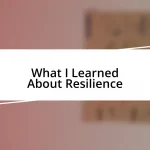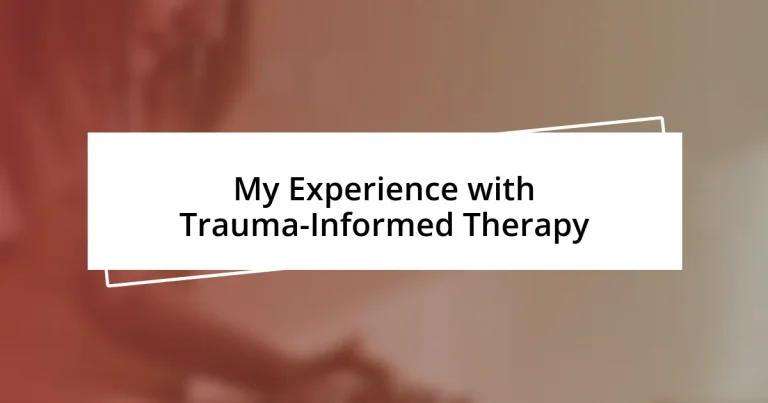Key takeaways:
- Trauma-informed therapy focuses on understanding the impact of trauma, shifting the narrative from “What’s wrong with you?” to “What happened to you?”
- Choosing the right therapist involves assessing connection, approach, trust, and intuition to ensure a supportive healing journey.
- Therapeutic techniques such as narrative therapy, mindfulness, and somatic experiencing can significantly enhance healing by fostering self-awareness and emotional regulation.
- Long-term benefits of therapy include increased emotional resilience, improved self-awareness, and a sense of empowerment to shape one’s future.
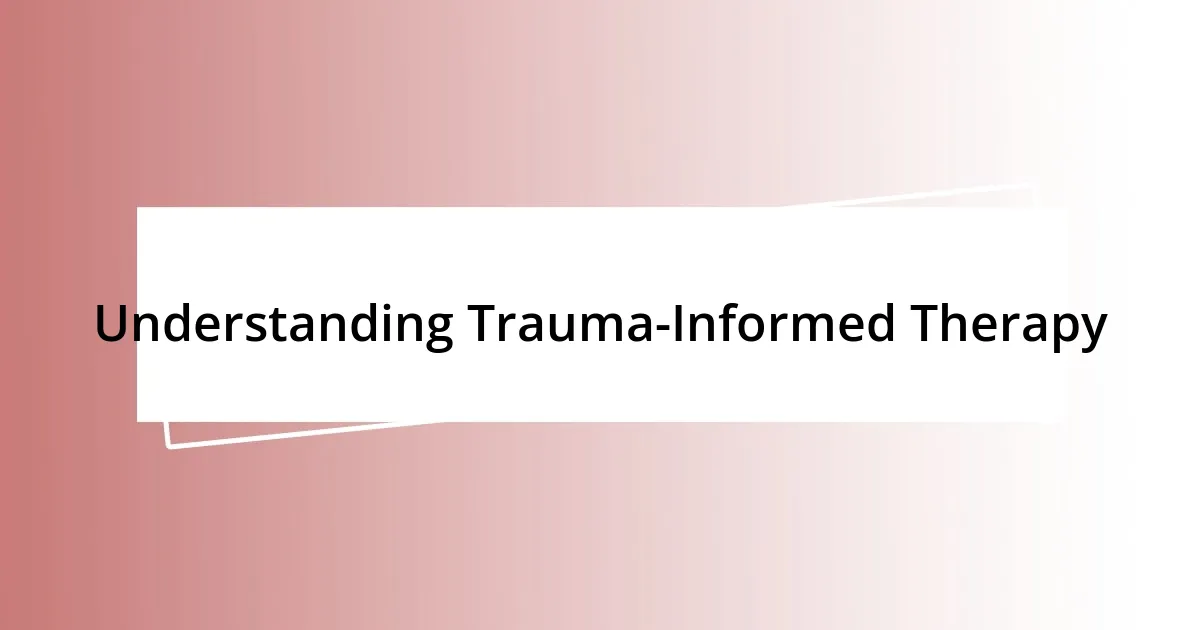
Understanding Trauma-Informed Therapy
Trauma-informed therapy emphasizes understanding how trauma affects a person’s life. I remember my first session, sitting there, feeling exposed as I shared my experiences. The therapist gently reminded me that my reactions weren’t just random; they were often rooted in past trauma. It made me feel validated and safe—did you ever realize how much a simple acknowledgment could change your perspective?
At its core, trauma-informed therapy shifts the focus from “What’s wrong with you?” to “What happened to you?” This framework encourages professionals to approach therapy with sensitivity, recognizing the deep emotional scars that can shape behavior. I recall feeling a wave of relief when I understood that my struggles were not personal failures but rather responses to my history. It begs the question: how would it feel to be seen with such compassionate understanding?
Moreover, this approach advocates for safety and trustworthiness in the therapeutic environment. I recall one conversation that illuminated the importance of establishing safety—my therapist took the time to explain boundaries, and it allowed me to lower my defenses. Isn’t it fascinating how safety can easily pave the way for healing?
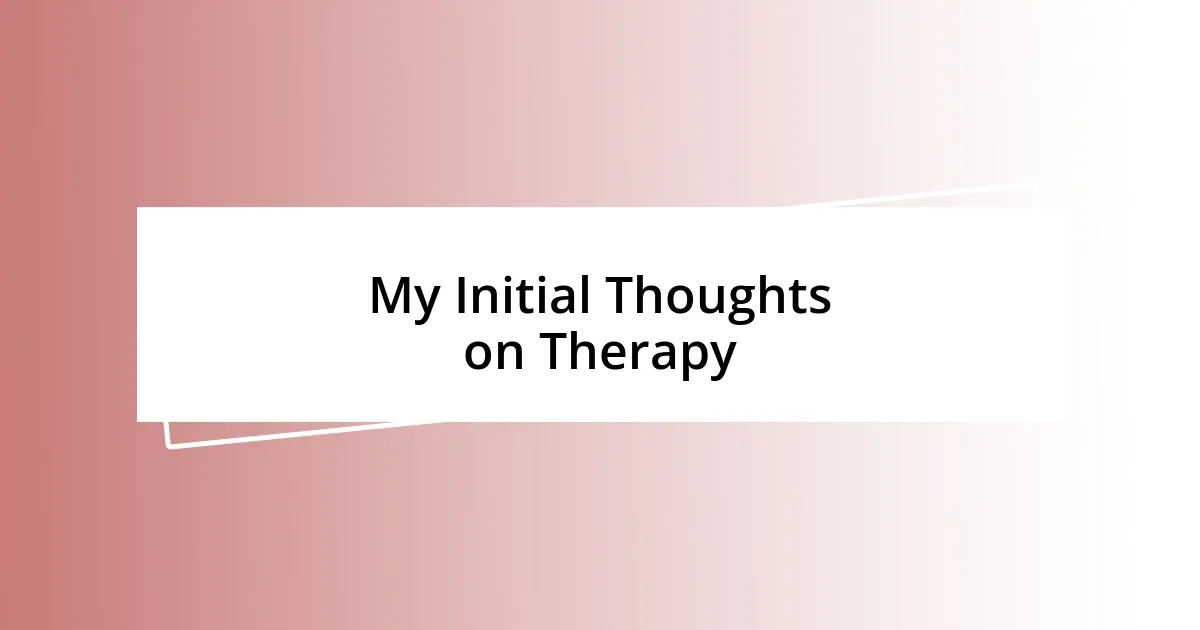
My Initial Thoughts on Therapy
When I first thought about therapy, I felt a mix of apprehension and curiosity. I had read countless articles and heard stories from friends who had varying experiences, but until I stepped into that room, I couldn’t grasp the complexity of the journey. There was this nagging question in my mind: Would this really help me?
Some initial thoughts that struck me included:
– The idea of opening up felt daunting.
– I worried about being judged or misunderstood.
– I hoped for a safe space where I could be vulnerable.
– I craved validation – a sense that my feelings were not only acceptable but worthy of discussion.
Navigating these thoughts was like walking through a fog; I couldn’t see the path ahead clearly. There’s a certain level of vulnerability that accompanies the decision to seek help. I remember standing outside the therapist’s office, heart racing, questioning if speaking my truth would change anything. Have you ever felt that way, caught between hope and fear?
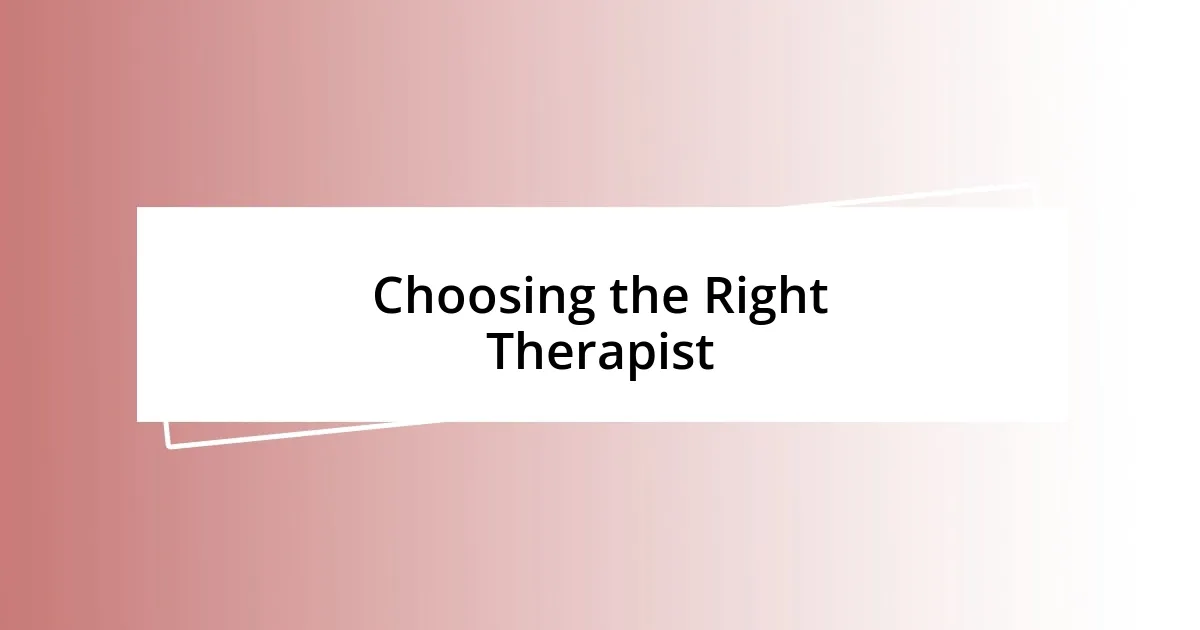
Choosing the Right Therapist
Choosing the right therapist is crucial for a successful healing journey. From my experience, I learned that compatibility goes beyond expertise; it’s about feeling a genuine connection. I remember a time when I interviewed several therapists, seeking someone who resonated with my story. It became clear that trust was non-negotiable. I felt an almost instant relief when I found a therapist whose approach aligned with my needs.
During my search, I realized the importance of understanding a therapist’s style and specializations. Some may adopt a more structured approach while others might lean into a conversational style. I met a therapist once who relied heavily on cognitive-behavioral techniques; it felt clinical and detached for me. In contrast, another therapist created a warm environment that encouraged deep emotional exploration, making me feel heard and understood.
Ultimately, trust your instincts. If something feels off during an initial consultation, don’t hesitate to keep looking. I learned to listen to my gut feelings; they often guided me to make the right choice. The right therapist can empower you, so take your time to find someone who feels like the right fit for you.
| Criteria | Considerations |
|---|---|
| Connection | Do you feel a sense of comfort when you speak with them? |
| Approach | Do their therapeutic methods resonate with your needs? |
| Trust | Do you feel safe disclosing personal experiences? |
| Intuition | Does something about the interaction feel right or wrong? |

First Session Experience Insights
Walking into my first therapy session was like stepping onto a tightrope. I recall that moment when I sat down, looking around at the room filled with soft lighting and cozy furniture. It felt inviting, yet I couldn’t shake the nerves. I wondered, would I have the courage to share my story, or would I hold back out of fear of vulnerability?
As we began, I was struck by how my therapist took the time to explain the principles of trauma-informed care. It was eye-opening to learn how essential it was for me to feel safe, both emotionally and physically. I remember thinking, “This isn’t just about talking; it’s about healing.” Realizing that this space was designed for my comfort made me more willing to open up, even if it felt like peeling back the layers of a well-guarded onion.
In that first session, I shared only fragments of my experience, yet my therapist’s gentle nods conveyed understanding. It was liberating and terrifying at once. The question lingered: could this path truly lead to clarity and relief? I found a flicker of hope amidst my uncertainties. Embracing that first leap was daunting but felt like an essential step towards reclaiming my narrative. Have you ever had that feeling, where sharing even the smallest pieced of yourself felt monumental?

Therapeutic Techniques and Approaches
In my experience with trauma-informed therapy, I encountered various therapeutic techniques that genuinely impacted my healing journey. One approach that resonated with me was narrative therapy, which encouraged me to reframe and reclaim my personal story. I still remember the first time I articulated my experience; it felt as if I was no longer just a victim of circumstances but an author of my own narrative. Isn’t it empowering to think of your life as a story you can reshape?
Another technique that deeply influenced my sessions was mindfulness. Initially, I was skeptical about focusing on the present when my past was so heavy. However, through guided practices, I slowly learned to anchor myself in the here and now. I vividly recall a session where, through breathing exercises, I could finally acknowledge my feelings without being overwhelmed by them. It was a gentle reminder that healing doesn’t always mean diving into the depths of pain; sometimes, it’s about learning to sit with our emotions calmly.
I also found the incorporation of body-based approaches, like somatic experiencing, to be illuminating. There were times during sessions when my therapist would encourage me to notice physical sensations in my body, connecting them to my emotions. I was surprised to discover how often my body held onto grief or tension. This awareness shifted my perspective; I realized healing was not only a mental exercise but a whole-body experience. Have you ever thought about how our bodies can communicate emotions that our minds struggle to articulate?
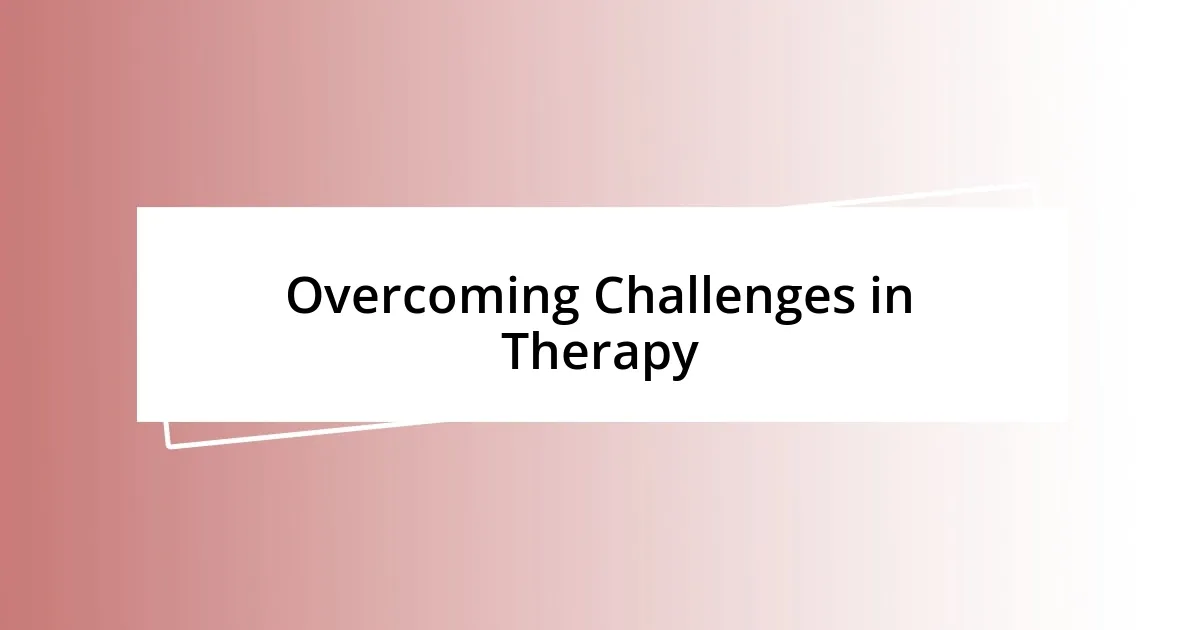
Overcoming Challenges in Therapy
During my therapy journey, I faced many challenges, especially when it came to confronting my emotions. I remember one session where I felt an overwhelming sense of dread just thinking about revisiting a painful memory. My therapist encouraged me to take it slow, reminding me that it was okay to feel whatever came up. I learned that sometimes, progress means just being brave enough to pause and breathe instead of pushing through the discomfort. Have you ever felt like stepping back was actually a step forward?
Another challenge I encountered was grappling with self-doubt. There were moments when I’d question whether this was all worth it, wondering if I would ever truly heal. I recall a particularly difficult week, where I felt stuck in a cycle of negative thinking. My therapist helped me reframe those thoughts, guiding me to recognize them as part of the healing process. This taught me that setbacks don’t define my journey; they’re just bumps in the road. Isn’t it fascinating how our minds can play tricks on us, making us believe we haven’t progressed when we really have?
Finally, navigating the relationship with my therapist was initially daunting. Building trust took time because I worried about being judged or misunderstood. However, there was a pivotal moment when I realized that my vulnerability was met with genuine compassion. I found solace in being authentically myself, which is something I’d hidden for so long. That connection transformed my therapy experience; it showed me how powerful a supportive relationship can be in overcoming challenges. Have you experienced a moment where feeling safe allowed you to let your guard down?
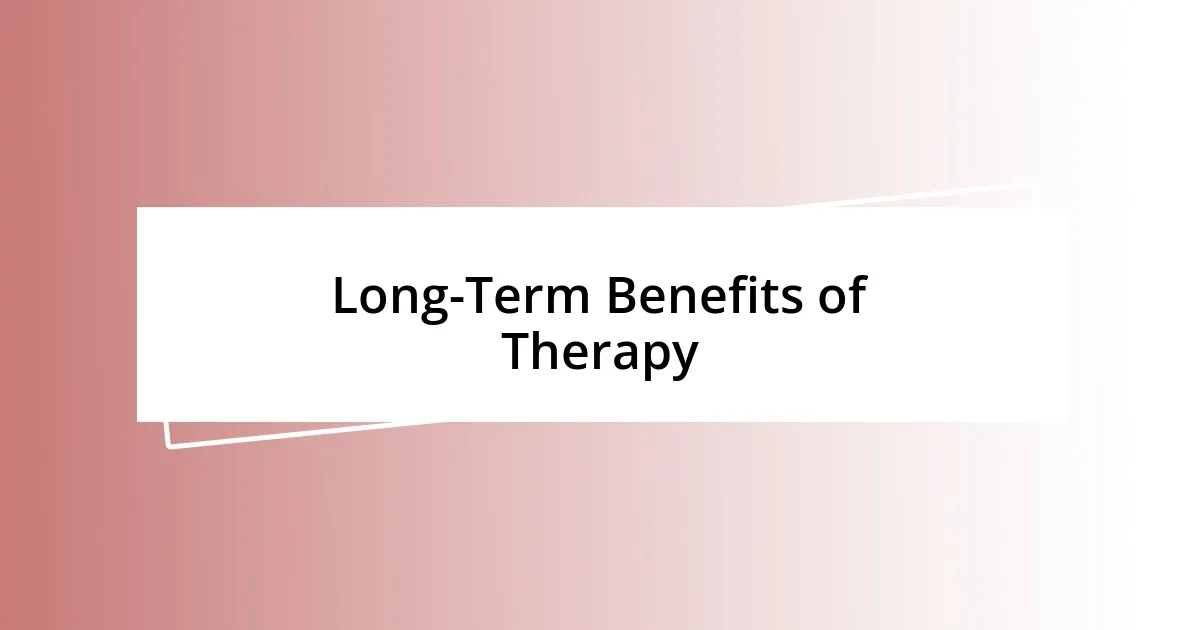
Long-Term Benefits of Therapy
The long-term benefits of therapy are something I find truly transformative. One significant change I noticed is my heightened sense of emotional resilience. Before therapy, I often felt overwhelmed by intense emotions, but now I can take a step back and process my feelings instead of merely reacting. This shift doesn’t just impact my current life; it builds a foundation for facing future challenges with more confidence. Have you ever noticed how past experiences can shape our responses to new situations?
Additionally, I’ve discovered a profound sense of self-awareness that guides my decisions and relationships. As I’ve learned to explore my thoughts and feelings more deeply, I also developed a better understanding of my triggers. This insight enables me to communicate more effectively with others, leading to healthier relationships and greater empathy. Isn’t it incredible how understanding ourselves can enrich our connections with the people around us?
Lastly, I cherish the feeling of empowerment that has become a staple in my life since starting therapy. Rather than being a passive character in my story, I actively participate in shaping my future. For instance, I’ve begun setting boundaries that were once difficult for me to establish. This newfound strength allows me to advocate for myself in a way I never thought possible. How liberating is it to realize that we can play an active role in our healing journey?
